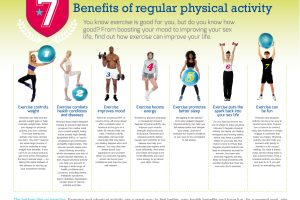Discovering the Benefits of Regular Exercise for Overall Well-being

Importance of Physical Activity
In today’s fast-paced world, physical activity often takes a back seat. Yet, its significance cannot be overstated. Regular exercise is not merely a means to achieve a particular physical appearance but is foundational to overall health and vitality. Imagine waking up every morning feeling energized, accomplishing tasks with ease, and enjoying your favorite activities without the nagging feeling of fatigue. This reality is achievable through a commitment to regular physical activity. Engaging in physical activity offers a multitude of benefits, including:
- Discovering the Benefits of Regular Exercise for Overall Well-being
- Importance of Physical Activity
- Connection Between Exercise and Well-being
- Physical Benefits of Regular Exercise
- Cardiovascular Health
- Weight Management
- Mental Benefits of Regular Exercise
- Stress Reduction
- Improved Mood
- Social Benefits of Regular Exercise
- Increased Confidence
- Enhanced Social Interactions
- Long-Term Benefits of Regular Exercise
- Disease Prevention
- Improved Quality of Life
- Improved cardiovascular health: A steady workout routine strengthens the heart and circulatory system.
- Increased stamina and endurance: Regular exercise allows the body to perform everyday tasks with less effort.
- Weight management: Staying active helps maintain a healthy weight by burning calories and increasing metabolism.
Connection Between Exercise and Well-being
The link between exercise and well-being goes beyond the physical. It profoundly impacts mental and emotional states. When individuals include physical activity in their daily lives, they often report feeling happier and more fulfilled. Consider Sarah, a busy professional who felt overwhelmed by her daily routines. After incorporating a 30-minute walk into her schedule, Sarah not only enhanced her physical fitness but also found herself feeling less stressed and more focused at work. This anecdote exemplifies the transformative power of physical activity. Some key benefits of exercise that contribute to well-being include:
- Enhanced mood: Exercise releases endorphins, often referred to as “feel-good” hormones.
- Stress relief: Physical activity is a natural way to reduce stress and anxiety levels.
- Increased energy levels: Regular movement enhances overall energy, making daily activities feel less burdensome.
The integration of regular exercise into one’s lifestyle leads to a richer, more enjoyable quality of life. It’s time to recognize that physical activity is not just an option but an essential part of living well.
Physical Benefits of Regular Exercise
Cardiovascular Health
Transitioning from the broader discussion on well-being, let’s delve into the specific physical benefits of regular exercise, starting with cardiovascular health. A strong heart is essential for maintaining overall health, and regular exercise plays a significant role in achieving this. Engaging in activities like jogging, cycling, or swimming can strengthen the heart muscle, improve blood circulation, and reduce the risk of heart disease. Jamie, an avid runner, noticed how her cardiac health improved significantly after committing to a regular jogging schedule. With each run, not only did her stamina increase, but her resting heart rate also dropped, indicating a healthier heart. Some important ways that exercise benefits cardiovascular health include:
- Lowering blood pressure: Regular physical activity helps keep blood pressure in check.
- Reducing cholesterol levels: Exercise can raise good HDL cholesterol while lowering bad LDL cholesterol.
- Improving blood circulation: Enhanced circulation leads to better oxygen supply throughout the body.
Weight Management
Next on the list of physical benefits is weight management, which is a common goal for many individuals embarking on an exercise journey. Regular physical activity helps to burn calories and maintain a healthy weight, which can be particularly beneficial for those seeking to prevent obesity-related diseases. Consider Mark’s experience—after adding strength training and cardio exercises to his routine, he found a balanced approach to weight loss that was sustainable. Not only did he shed extra pounds, but he also developed muscle tone that improved his overall physique. Here are some key points on how regular exercise supports weight management:
- Calorie burn: Higher activity levels increase the number of calories burned, vital for weight loss.
- Boosted metabolism: Exercise helps increase metabolic rate, which can support weight maintenance.
- Healthy habits: Incorporating regular activity often leads to better dietary choices, creating a positive cycle.
Understanding these physical benefits emphasizes the importance of regular exercise in maintaining a healthy body, paving the way for improved health outcomes throughout one’s life.
Mental Benefits of Regular Exercise
Stress Reduction
Continuing from the discussion about physical benefits, the mental benefits of regular exercise are equally significant and cannot be overlooked. One of the primary advantages of engaging in physical activity is stress reduction. In our fast-paced lives, stress management is more important than ever, and exercise serves as a natural remedy. When individuals exercise, their bodies release endorphins, which are powerful stress-relievers. This biochemical reaction helps create a sense of well-being and relaxation. Take Tara as an example—she found herself juggling work responsibilities and family commitments, leaving her feeling overwhelmed. After starting a daily yoga practice, she noticed a remarkable decline in her stress levels. Each session helped her stay grounded and centered, enabling her to tackle life’s challenges more effectively. Some effective ways exercise aids in stress reduction include:
- Distraction: Physical activity provides a break from daily stressors, allowing the mind to reset.
- Increased confidence: Regular exercise often boosts self-esteem, providing a positive outlook amidst stress.
- Social interaction: Group activities, like team sports or fitness classes, foster connections that can alleviate feelings of isolation and anxiety.
Improved Mood
In addition to stress reduction, regular exercise plays a crucial role in improving mood. Many individuals report feeling happier and more energized after a workout. This improvement is not merely anecdotal; scientific studies consistently show a correlation between physical activity and enhanced mental well-being. Consider Jacob, who faced seasonal affective disorder. During gloomy winter months, he often felt low and unmotivated. By committing to a consistent workout routine, he experienced an uplift in his mood and a reduction in depressive symptoms. Exercise became his go-to strategy for combating the winter blues. Here are some highlights on how exercise boosts mood:
- Endorphin release: Physical activity triggers the release of these “feel-good” hormones.
- Routine formation: A consistent exercise schedule provides structure and purpose, contributing to a positive mindset.
- Social connections: Participating in group activities fosters friendships and a sense of belonging, further enhancing mood.
By understanding the mental benefits of exercise, individuals can better appreciate its role in promoting overall well-being and leading a balanced life. Regular activity not only transforms the body but also nurtures a healthier, happier mind.
Social Benefits of Regular Exercise
Increased Confidence
Building on the mental benefits we’ve discussed, let’s explore the social benefits of regular exercise, particularly increased confidence. Engaging in physical activities can significantly boost an individual’s self-esteem and self-worth. This transformation often happens as people achieve personal milestones, whether it’s completing a challenging workout or reaching fitness goals. Take Lisa, for example. A few months ago, she joined a group fitness class, feeling unsure about her body and abilities. However, as she continued to attend classes and noticed improvements in her strength and endurance, her confidence began to flourish. She started to embrace her fitness journey, fostering a positive self-image that extended beyond the gym. Key factors that contribute to increased confidence through exercise include:
- Achievement and accomplishment: Setting and reaching fitness goals reinforces a sense of success.
- Enhanced physical appearance: Many people feel more attractive and confident as they become fitter.
- Empowerment: Regular exercise can provide a sense of control that translates into other life areas, including work and relationships.
Enhanced Social Interactions
Alongside increased confidence, regular exercise fosters enhanced social interactions. Participating in group activities or team sports creates opportunities to meet new people and build lasting friendships. The shared experience of working towards fitness goals brings individuals together, forming bonds that can lead to a supportive community. Consider Tom, who joined a local soccer league to stay active. Initially apprehensive about meeting new people, he soon discovered a warm, welcoming community of like-minded enthusiasts. Through training sessions and matches, Tom not only improved his physical fitness but also forged friendships that have enriched his social life. Some noteworthy benefits of enhanced social interactions through exercise include:
- Social support: The camaraderie found in group settings can offer motivation and encouragement.
- Networking opportunities: Engaging in fitness activities can lead to connections that extend beyond the gym, creating new friendships and professional opportunities.
- Reduced feelings of isolation: Shared workouts or activities foster a sense of belonging, combating loneliness and enhancing emotional well-being.
By realizing these social benefits, individuals can appreciate how regular exercise not only transforms their bodies and minds but also enriches their social lives, creating a fulfilling and connected lifestyle. Regular activity is not just about the individual journey; it helps cultivate a sense of community and support that enhances overall satisfaction in life.
Long-Term Benefits of Regular Exercise
Disease Prevention
As we transition from the social benefits of exercise, it’s crucial to address the long-term benefits, particularly in terms of disease prevention. Engaging in regular physical activity is one of the most effective strategies for reducing the risk of chronic diseases. The impact of exercise on health is profound, and it creates a protective effect against various conditions. Consider Mark, who made a lifestyle change in his 40s by incorporating exercise into his routine after his family history showed a tendency toward heart disease and diabetes. By prioritizing physical activity, he not only improved his fitness but also took significant strides toward disease prevention. His annual health check-ups revealed lower blood pressure and cholesterol levels, and he felt empowered to take charge of his health. Here are some key ways that regular exercise can prevent disease:
- Cardiovascular disease: Consistent physical activity strengthens the heart, improving circulation and reducing high blood pressure.
- Type 2 diabetes: Exercise helps regulate blood sugar levels and improves insulin sensitivity.
- Certain cancers: Research suggests that regular physical activity may lower the risk of certain types of cancer, including breast and colon cancers.
Improved Quality of Life
In addition to disease prevention, regular exercise greatly enhances the overall quality of life. An active lifestyle isn’t just about longevity; it’s about living life to the fullest. The benefits of being physically active reflect across various aspects of daily living. Take Patricia, an active retiree who dedicates several days a week to hiking with friends. Her passion for exploring nature has not only kept her physically fit, but it has also enriched her life with social events and adventures. Patricia feels energized and engaged, demonstrating how exercise can contribute to an enjoyable and fulfilling life. Key elements of improved quality of life through exercise include:
- Enhanced mobility and flexibility: Regular activity keeps joints healthy and improves balance, allowing for greater independence.
- Better sleep quality: Engaging in physical exercise often leads to deeper, more restorative sleep.
- Increased energy levels: Regular workouts can boost overall energy, making it easier to tackle daily tasks and enjoy leisure activities.
By focusing on long-term benefits such as disease prevention and improved quality of life, individuals can better appreciate the lasting impacts of maintaining a consistent exercise routine. Overall, committing to regular physical activity not only nurtures the body but also enriches the mind and spirit, leading to a more vibrant and fulfilling life.




